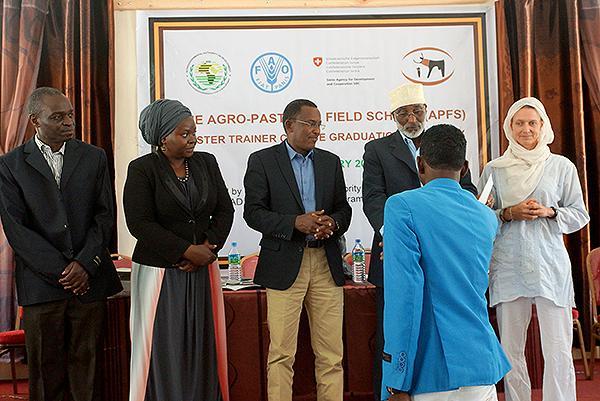The Intergovernmental Authority on Development (IGAD) Sheikh Technical Veterinary School (ISTVS) on February 27, 2017 held a graduation ceremony at the conclusion of a three- month Agro-Pastoral Field School Master Training course at the school premises.
The training was supported under the IGAD-FAO partnership programme on Drought Resilience: Regional Initiative in Support of (Agro-) Pastoralists Communities’ Resilience in the Horn of Africa funded by the Swiss Agency for Development Cooperation (SDC) and jointly implemented in partnership with the Food and Agriculture Organization of the United Nations (FAO).
The training programme was designed to support the implementation of the IGAD Drought Disaster Resilience Sustainability Initiative (IDDRSI) through knowledge and skills development among students who would use these new skills among people in their different communities at their duty stations, as well as those in the ISTVS neighborhood as a mechanism towards drought resilience and food security and nutrition.
The 21 graduates, four of whom are women, are expected to go back to their communities and train local facilitators through the use of concepts, modules and principles, methodologies for participatory community development and technical knowledge acquired during the training to ensure sustainability and continuity.
Mr. Fred Wesonga, the Principal at ISTVS, gave a hearty welcome to the IGAD, FAO and Swiss delegation. He emphasized that such trainings can and will change lives through reaching the communities and availing first hand information and practical solutions.
According to Dr. Deborah Duveskog, Agricultural Officer at FAOs sub-regional resilience team, achieving food security and eradication of hunger are key to their mandate hence the reason FAO partners with regional organizations such as IGAD and their member states to reach communities on the ground.
“ Building resilience should be taken seriously. FAO does this by building capacity for practical, sustainable and gender inclusive solutions through these kinds of trainings in order to create a lasting change at community level”, Ms. Duveskog added.
Abdullahi Khalif, Senior Regional Food Security Advisor at the Swiss International Cooperation emphasized the need for doing things differently in the fragile States, empowering communities to manage their actions and investment plans. He added that provision and support to technical and vocational training across the region give meaningful employment for the youth and for effective implementation of development projects.
He added that challenges such as drought and climate change remain with us but should be seen as opportunities for governments, organisations and beneficiaries through the change of attitudes and do things differently towards a food secure and sustainable continent.
Ms. Caroline Kirungu, an Agro-climatogist and Project coordinator from IGAD Centre for Pastoral and Livestock Development (ICPALD), requested the graduates to be ambassadors of the resilience agenda. She emphasized the importance of the graduates to go back to their communities and practice what they have learnt in order to build their communities for a better tomorrow.
The graduation ceremony was officiated by the Deputy Minister of Livestock of Somaliland and attended by representatives from FAO Swiss International Cooperation and Mandera County, Kenya.

